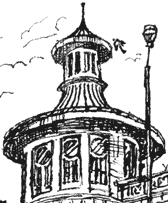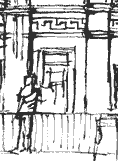|
 One
man told me that he'd met his wife in there - at the time that it was
a Mecca Lecarno Ballroom; it had sparkling chandeliers
and a mirror-ball. Once, he told me, Miss World attended a glittering
evening there; this was in a year when Miss America won the competition. One
man told me that he'd met his wife in there - at the time that it was
a Mecca Lecarno Ballroom; it had sparkling chandeliers
and a mirror-ball. Once, he told me, Miss World attended a glittering
evening there; this was in a year when Miss America won the competition.
A few people stopped to look at my drawing (and make favourable comments,
I'm glad to say) as I sat on my canvas chair on the corner by the pedestrian
crossing opposite this 1920s cinema on the corner of
Boston Street and London Road, just to the south of the Sheffield
city centre. A woman told me that this part of town was once once known
as 'Little Sheffield' and it bustled with workshops making cutlery and
buttons. She said she'd first become aware of the history of the area
when she'd noticed the plank-like width of the floorboards in the office
she worked in, in a building a little way along the London Road; she went
to the city archives to find out more about the area.
Pagoda
 Some
people are convinced that this remaining facade of the building will be
demolished ('they'll use any excuse', they grumble) but other's tell me
that it will be restored as part of the current residential development
on the site. One man pointed out that the building still boasts most of
its original glass and he thought that attractive details would emerge
from under the black gunge that it is coated in. Some
people are convinced that this remaining facade of the building will be
demolished ('they'll use any excuse', they grumble) but other's tell me
that it will be restored as part of the current residential development
on the site. One man pointed out that the building still boasts most of
its original glass and he thought that attractive details would emerge
from under the black gunge that it is coated in.
I've never lived in Sheffield but I've got family connections with this
area; my granddad had a business nearby, as did my uncle. My mum remembers
seeing films here before the war; the auditorium was rather cramped, with
a sloping floor. But one detail that she'd forgotten was that, as one
couple told me, it had been a branch of Marks and Spencer,
immediately after the war, when much of Sheffield was being rebuilt following
bomb damage.
Trashed on Cider
Further down Boston Street, about 50 yards beyond the
Pagoda, there's a new brick building called the Forge,
part of a student campus. Following a poetry festival last November, it
now boasts a short poem set in brushed steel letters on the wall. It's
the first published poem by Jarvis Cocker:
| |
Within these walls the future may be being forged
Or maybe Jez is getting trashed on cider
But when you melt you become the shape of your surroundings: Your
horizons become wider.
Don't they teach you no brains that at school?
Trashed on Cider
Jarvis Cocker |
|
 That's
just the insight that I'd like to put across in my Peak District sketchbook. That's
just the insight that I'd like to put across in my Peak District sketchbook.
No, not the bit about getting trashed on cider!

Richard Bell, richard@willowisland.co.uk
|
 That's
just the insight that I'd like to put across in my Peak District sketchbook.
That's
just the insight that I'd like to put across in my Peak District sketchbook.![]()